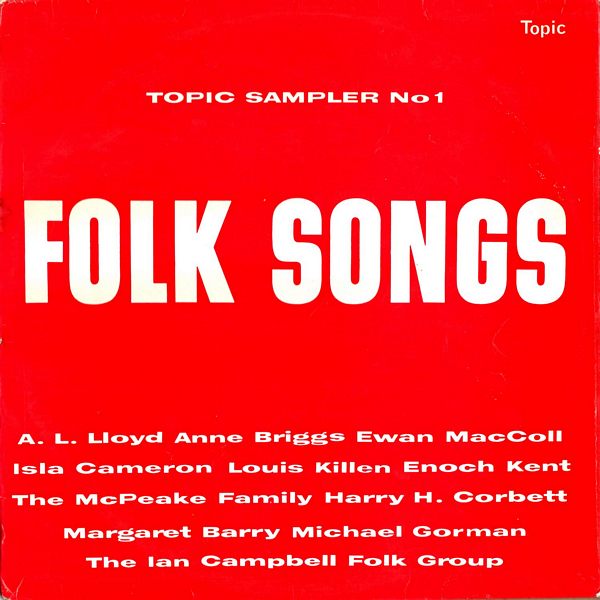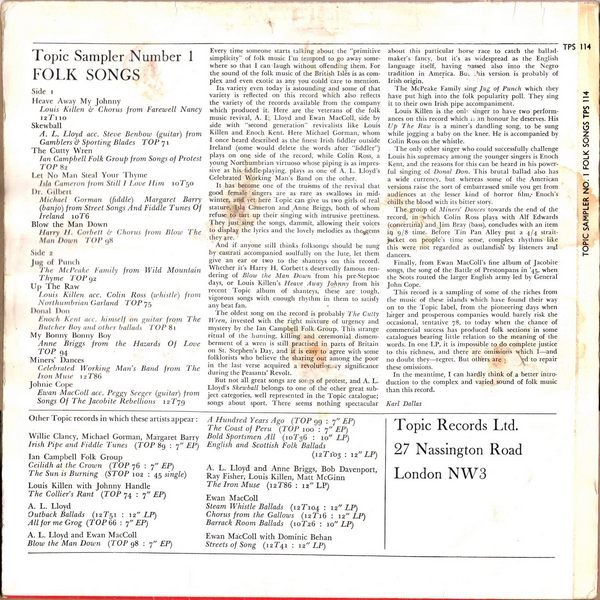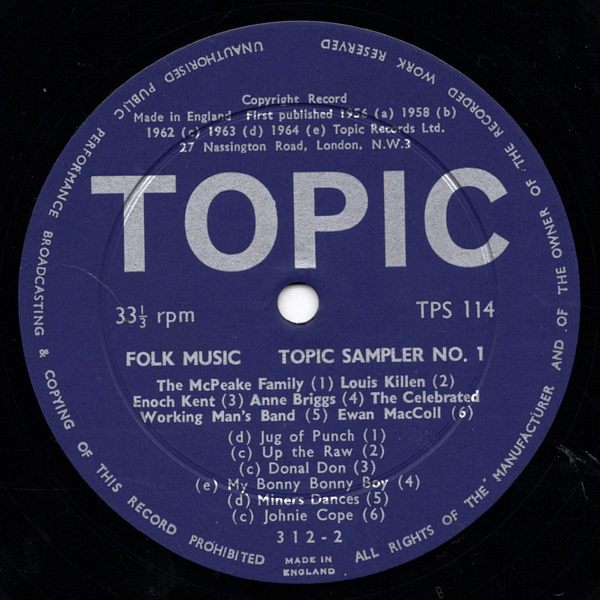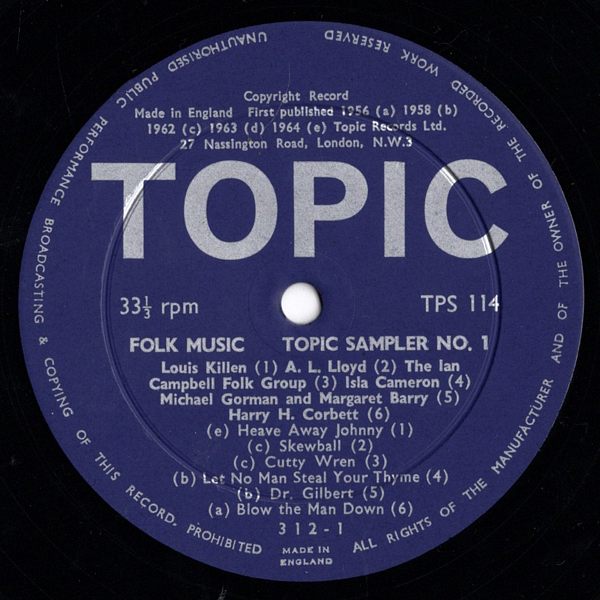
 |


 |
Sleeve Notes
Every time someone starts talking about the "primitive simplicity" of folk music I'm tempted to go away somewhere so that I can laugh without offending them. For the sound of the folk music of the British Isle is as complex and even exotic as any you could care to mention.
Its variety even today is astounding and some of that variety is reflected on this record which also reflects the variety of the records available from the company which produced it. Here are the veterans of the folk music revival, A. L Lloyd and Ewan MacColl, side by side with "second generation" revivalists like Louis Killen and Enoch Kent. Here Michael Gorman, whom I once heard described as the finest Irish fiddler outside Ireland (some would delete the words after "fiddler") plays on one side of the record, while Colin Ross, a young Northumbrian virtuoso whose piping is as impressive as his fiddle-playing, plays as one of A. L. Lloyd's Celebrated Working Man's Band on the other.
It has become one of the truims of the revival that good female singers are as rare as swallows in midwinter, and yet here Topic can give us two girls of real stature, Isla Cameron and Anne Briggs, both of whom refuse to tart up their singing with intrusive prettiness. They just sing the songs, dammit, allowing their voices to display the Lyrics and the lovely melodies as the gems, they are.
And if anyone still thinks folksongs should be sung by castrati accompanied soulfully on the lute, let them give an ear or two to the shanteys on this record. Whether it's Harry H. Corbett's deservedly famous rendering of Blow the Man Down from his pre-Steptoe days, or Louis Killen's Heave Away Johnny from his recent Topic album of shanteys, these are tough, vigorous songs with enough rhythm in them to satisfy any beat fan.
The oldest song on the record is probably The Cutty Wren, invested with the right mixture of urgency and mystery by the Ian Campbell Folk Group. This strange ritual of the hunting, killing arid ceremonial dismemberment of a wren is still practised in parts of Britain on St. Stephen's Day, and it is easy to agree with some folklorists who believe the sharing out among the poor in the last verse acquired a revolutionary significance during the Peasants' Revolt.
But not all great songs are songs of protest, and A. L. Lloyd's Skewball belongs to one of the other great subject categories, well represented in the Topic catalogue; songs about sport. There seems nothing spectacular about this particular horse race to catch the ballad-maker's fancy, but it's as widespread as the English itself, having passed also into the Negro tradition in America. But this version is probably of Irish origin.
The McPeake Family sing Jug of Punch which they have put high into the folk popularity poll. They sing it to their own Irish pipe accompaniment.
Louis Killen is the one singer to have two performances on this record which is an honour he deserves. His Up The Raw is a miner's dandling song, to be sung while jogging a baby on the knee. He is accompanied by Colin Ross on the whistle.
The only other singer who could successfully challenge Louis his supremacy among the younger singers is Enoch Kent, and the reasons for this can be heard in his powerful singing of Donal Don. This brutal ballad also has a wide currency, but whereas some of the American versions raise the sort of embarrassed smile you get from audiences at the lesser kind of horror film, Enoch's chills the blood with its bitter story.
The group of Miners' Dances towards the end of the record, in which Colin Ross plays with Alf Edwards (concertina) and Jim Bray (bass), concludes with an item in 9/8 time. Before Tin Pan Alley put a 4/4 straitjacket on people's time sense, complex rhythms like this were not regarded as outlandish by listeners and dancers.
Finally, from Ewan MacColl's fine album of Jacobite songs, the song of the Battle of Prestonpans in '45, when the Scots routed the larger English army led by General John Cope.
This record is a sampling of some of the riches from the music of these islands which have found their way on to the Topic label, from the pioneering days when larger and prosperous companies would barely risk the occasional, tentative 78, to today when the chance of commercial success has produced folk sections in some catalogues bearing little relation to the meaning of the words. In one LP, it is impossible to do complete justice to this richness, and there are omissions which I—and no doubt they—regret. But others are prepared to repair these omissions.
In the meantime, I can hardly think of a better introduction to the complex and varied sound of folk music than this record.
Karl Dallas